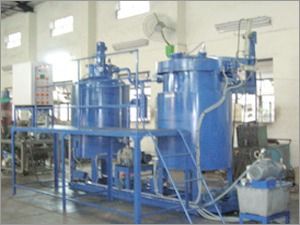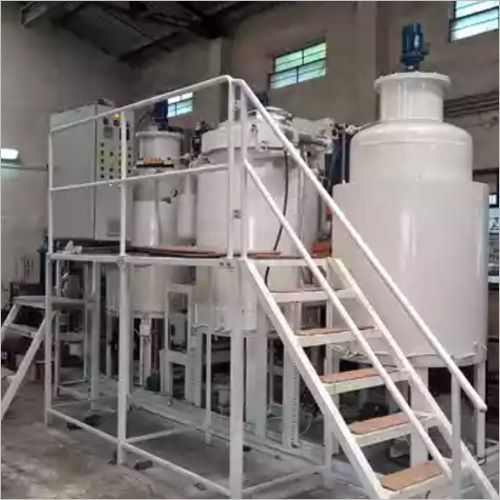
Vacuum Impregnation Machines
500000 INR/Unit
Product Details:
- Type Impregnating Machine
- Material Mild Steel
- Computerized No
- Automatic Grade Automatic
- Voltage 415 V Volt (v)
- Color Multicolor
- Warranty Yes
- Click to View more
X
Vacuum Impregnation Machines Price And Quantity
- 1 Unit
- 500000 INR/Unit
Vacuum Impregnation Machines Product Specifications
- 415 V Volt (v)
- Impregnating Machine
- No
- Multicolor
- Yes
- Mild Steel
- Automatic
Vacuum Impregnation Machines Trade Information
- Telegraphic Transfer (T/T), Cheque
- 4-5 Unit Per Week
- 4-5 Week
- Western Europe, Australia, North America, Eastern Europe, Middle East, Central America, Africa, South America, Asia
- All India
Product Description
Stainless steel made Vacuum Impregnation Machines are used to improve insulation properties of power capacitor, wind turbine, high voltage generator and so on. These machines comprise of vacuum chamber having standard diameter, non automatically managed clamping system, paint storage tank, magnetic filtration section and electrical control system. Pressure section of these equipments consists of safety components, moisture separator and pressure regulator. Metal stirrer of these machines has standard operating speed. Impregnation tank of these systems is designed with vacuum breaker, bayonet clamping, safety valve and pressure relief valve. We are reckoned as a prestigious manufacturer and exporter of best grade Vacuum Impregnation Machines.Vacuum Impregnation Machine Features:
1) Provided equipments can be obtained with galvanized surface.
2) These systems adopt HMID or SCADA and PLC based controlling mechanism.
3) Energy efficient operation and low operation cost
4) High speed of stirrer, manual clamping system, standard operating pressure range
Efficient Industrial Impregnation Solution
The Vacuum Impregnation Machine delivers superior sealing for porous materials, essential in industries like automotive, electrical, and metalworking. Its automatic functionality streamlines the impregnation process, ensuring precise performance with minimal manual intervention. Built from mild steel, the machine withstands demanding industrial environments, supporting long-term stable operations, enhancing productivity and product reliability.
Warranty and After-Sales Support
Purchasing this machine includes full warranty coverage, offering peace of mind and ensuring product longevity. Our support extends to installation guidance, operation training, and regular maintenance recommendations. As a recognized exporter and supplier in India, we prioritize robust after-sales service and customer satisfaction throughout the products lifecycle.
FAQs of Vacuum Impregnation Machines:
Q: How does the Vacuum Impregnation Machine operate automatically in industrial settings?
A: The automatic grade Vacuum Impregnation Machine utilizes programmed controls to perform the entire impregnation cycle without the need for manual input. Operators simply set the required parameters and the machine ensures consistent and thorough treatment of parts, streamlining industrial production processes.Q: What materials and components are suitable for processing with this machine?
A: The machine is ideal for processing metal components susceptible to porosity, including castings and sintered parts. Its mild steel construction and design accommodate a range of industrial applications, focusing on high-quality results and durability for various manufacturing sectors.Q: When is vacuum impregnation required during manufacturing processes?
A: Vacuum impregnation is typically employed after components are cast or fabricated and before final assembly or finishing. This process enhances the reliability and lifespan of products by sealing internal porosities, preventing leaks, and improving structural integrity.Q: Where can the Vacuum Impregnation Machine be installed and used most effectively?
A: The machines are best suited for industrial environments, such as production plants in automotive, electrical, and casting industries. Their robust build and automatic operation make them ideal for facilities aiming for efficient, large-scale impregnation processes.Q: What is the process involved in vacuum impregnation using this machine?
A: The machine creates a vacuum to remove air from porous parts, introduces impregnation material, and then applies pressure to ensure deep and thorough penetration. This automated process results in improved sealing and durability of treated components.Q: How does using this machine benefit industrial manufacturing operations?
A: Employing the Vacuum Impregnation Machine reduces waste, improves product reliability, and minimizes manual labor. The automated process shortens production cycles, ensures consistent quality, and supports high-volume output, leading to cost-efficiency for manufacturers.Tell us about your requirement

Price:
Quantity
Select Unit
- 50
- 100
- 200
- 250
- 500
- 1000+
Additional detail
Mobile number
Email
Other Products in 'Vacuum Impregnation Plants' category
AR ENGG. AND INNOVATIONS PRIVATE LIMITED
GST : 27ABACA4684J1ZF
GST : 27ABACA4684J1ZF




 Send Inquiry
Send Inquiry Send SMS
Send SMS
